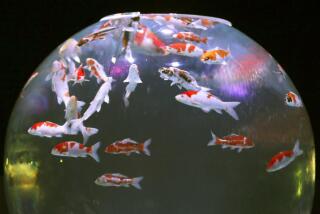Japan Finds a Symbiosis With China
- Share via
If you want to understand how Japan hopes to become increasingly flush in the world economy, look no further than Toto Ltd., a maker of high-tech bathroom fixtures.
“Toto flushing-toilet sales in China double every year,” notes Osamu Watanabe, chairman of the governmental Japan External Trade Organization.
It is a clear indicator, Watanabe says, that “living standards are rising in China” -- and that Japan is firmly focused on tapping that growing wealth.
In all, Japan ships about $80 billion of goods to China, up from $20 billion six years ago.
Meanwhile, like their counterparts in the United States, Japanese companies have been outsourcing more and more of their manufacturing to China.
But unlike in the United States, there appears to be little hand-wringing over the trend.
That’s a switch. In the early 1990s, “we saw China as a threat,” explains Watanabe, who has worked for 40 years in Japan’s powerful trade and industry ministries. “If a factory moved production to China, a village in Japan would have unemployment.
“But then we saw that as products are assembled, China needs parts and materials from Japan” -- in particular, the most sophisticated components.
So in 1996, Japan decided to move away from trying to compete with China in churning out lower-cost goods. Instead, it began to concentrate on making high-tech products.
The result: China may assemble all sorts of electronic gadgets. But Japan is determined that its companies, such as Sharp Corp. and Seiko Epson Corp., will develop the high-end liquid-crystal displays that go into these computers, telephones and televisions. China may put together toilets and bidets, but Toto will supply their microprocessor controls.
As it pursues this strategy, Watanabe says, Japan is eager to attract more investment from U.S. companies, particularly small and mid-size firms that can bring their technological know-how with them.
American companies “will find Japan a good place to invest because we are a gateway to Asia,” Watanabe told an audience of businesspeople in Los Angeles last week.
It is striking, of course, that Japan -- which before its bubble burst was poised to become the world’s leading economy -- now considers itself a mere “gateway” to someplace else.
But China’s allure is incredibly powerful.
The country’s “contribution to global economic growth is now second only to that of the United States,” says Kenneth Courtis, Goldman Sachs & Co.’s vice chairman and chief economist for Asia. “If its growth continues at its present pace,” Courtis adds, “within 15 years, China’s economy will be as large as Japan’s is now” -- that is, the second biggest in the world.
To be sure, some caution that the giant may stumble.
Just last week, as China’s government moved to tamp down inflationary pressures by reining in lending by state banks, global commodity markets tanked. The price of copper, steel and aluminum tumbled as traders worried that a throttling back in China could trigger a worldwide economic slowdown.
Other concerns also linger.
“The worry is that if China slows its economy too much, unemployment will rise and lead to social unrest,” says James Barth of the Milken Institute in Santa Monica, who has spent two years in China advising its government on reforms of the banking system.
Richard Baum, a China scholar at UCLA, agrees: “Unemployment is high,” he points out, while “income disparities and the plight of peasants are brewing dissatisfaction.”
Yet for all its very serious problems, China remains a red-hot engine of economic expansion. And Japan is determined to go along for the ride.
Ultimately, Watanabe suggests, Tokyo will take the lead in creating an East Asian Free Trade Area that would include Japan, China and the 10 countries of the Assn. of Southeast Asian Nations. (Among them are Indonesia, Singapore, Thailand and Vietnam.)
This vision may be a bit far-fetched given the level of distrust that has long divided Japan, China and their East Asian neighbors. Negotiating accords, Watanabe concedes, “will take hard efforts.”
Yet that Japan is even thinking this way underscores how in today’s economy, where the globe is rapidly shrinking and China is inexorably rising, it’s probably wisest not to try to beat ‘em. Rather, it’s smarter to figure out how to join ‘em.
James Flanigan can be reached at jim.flanigan @latimes.com. For previous columns go to latimes.com/ flanigan
More to Read
Inside the business of entertainment
The Wide Shot brings you news, analysis and insights on everything from streaming wars to production — and what it all means for the future.
You may occasionally receive promotional content from the Los Angeles Times.








